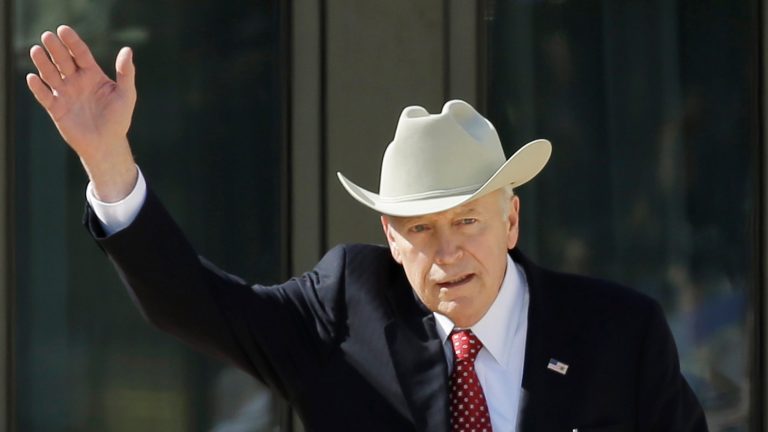Former United States Vice President Dick Cheney, one of the most powerful and divisive figures in modern American politics, has died at the age of 84. Cheney, long recognized as the principal architect behind the Iraq War, leaves behind a complex legacy defined by power, ambition, and deep controversy. His passing closes a historic chapter on an era that reshaped American foreign policy and the nation’s role in global security.
Early Life and Rise to Power
Richard Bruce Cheney was born on January 30, 1941, in Lincoln, Nebraska, and raised in Casper, Wyoming. His early life was marked by modest beginnings, but his academic excellence and political drive soon brought him to Washington, D.C. Cheney attended Yale University briefly before earning degrees from the University of Wyoming, setting the stage for a career that would span over five decades
Cheney began his political journey in the late 1960s, working under Donald Rumsfeld during the Nixon and Ford administrations. By 1975, he became the youngest White House Chief of Staff in U.S. history under President Gerald Ford, where he quickly gained a reputation for discipline, strategic thinking, and political precision.
Following Ford’s loss in 1976, Cheney returned to Wyoming and won election to the U.S. House of Representatives. He served for six terms, becoming a respected conservative voice and earning leadership positions within the Republican Party. His legislative experience and insider knowledge of Washington’s power structures made him one of the most influential figures of the Reagan and George H. W. Bush years.
Secretary of Defense and the First Gulf War
In 1989, Cheney was appointed Secretary of Defense by President George H. W. Bush. During his tenure, he oversaw Operation Desert Storm, the U.S.-led coalition that liberated Kuwait after Iraq’s invasion in 1990. The swift military victory elevated Cheney’s national profile and solidified his image as a strong advocate for military preparedness and global intervention when deemed necessary.
Despite calls to push deeper into Iraq and remove Saddam Hussein, Cheney chose restraint, famously remarking that such a decision could destabilize the region. Ironically, more than a decade later, he would reverse that position as Vice President under George W. Bush.
The Halliburton Years
After leaving government in 1993, Cheney entered the private sector as CEO of Halliburton, one of the world’s largest oilfield service companies. His time at Halliburton expanded his understanding of global energy markets and international business, though it would later fuel criticism that his business connections influenced government contracts during the Iraq War.
By the late 1990s, Cheney was viewed as a statesman of experience and intellect. When George W. Bush sought a running mate for the 2000 presidential campaign, Cheney led the search committee — only to choose himself. The Bush-Cheney ticket would go on to win one of the most contested elections in American history.
The Bush Administration and the War on Terror

Vice President Cheney addresses the members of the 2006 graduating class of the United States Naval Academy in Annapolis, Md., Friday, May 26, 2006. 980 were graduated in the ceremony. (AP Photo/Chris Gardner) Cc:News9
When Cheney took office as Vice President in 2001, the role was often considered largely ceremonial. However, his tenure fundamentally transformed the position. Following the September 11, 2001 terrorist attacks, Cheney emerged as the most influential voice in the Bush administration, shaping U.S. policy on defense, intelligence, and counterterrorism.
He became a driving force behind the U.S. invasion of Afghanistan in 2001 and later the Iraq invasion in 2003. Cheney argued that Iraq possessed weapons of mass destruction and posed a grave threat to American security — claims that were later proven unfounded. The Iraq War became one of the most controversial military campaigns in modern history, costing hundreds of thousands of lives and trillions of dollars.
Supporters viewed Cheney as a steadfast leader who protected the U.S. in uncertain times. Critics, however, saw him as the embodiment of unchecked executive power, accusing him of manipulating intelligence to justify war and eroding civil liberties through programs such as warrantless surveillance and enhanced interrogation techniques.
The Legacy of Power and Controversy
Cheney’s influence over the presidency was unparalleled. His close relationship with President Bush gave him access to national security decisions that no previous vice president had enjoyed. He helped expand presidential authority, promoting the concept of the “unitary executive,” which granted broad wartime powers to the White House.
While Cheney maintained a low public profile during his vice presidency, his policies shaped America’s 21st-century political landscape. From counterterrorism to foreign intervention, his fingerprints remain visible across multiple administrations.
Personal Life and Health Struggles
Cheney’s health had been a major concern for decades. He suffered his first heart attack at age 37, followed by several more over the years. In 2012, he underwent a successful heart transplant, a procedure that prolonged his life and allowed him to remain active in politics and public commentary.
Despite his declining health, Cheney remained a vocal figure within the Republican Party. In recent years, he distanced himself from the party’s populist direction and voiced opposition to former President Donald Trump. His daughter, Liz Cheney, followed in his footsteps as a U.S. Representative, becoming one of Trump’s fiercest critics within the GOP.
Final Years and Death
Dick Cheney passed away at his home in Virginia, surrounded by his wife Lynne and daughters Liz and Mary. The family confirmed that he died peacefully after years of battling cardiovascular disease. His death ends the life of a man whose political decisions continue to influence U.S. foreign and domestic policy.
In his later years, Cheney reflected on his time in office with pride. He defended the Iraq invasion as a necessary step for American security and expressed little regret for the decisions that defined his career. Despite intense criticism, he remained steadfast in his belief that his actions kept the nation safe.
A Divisive Legacy in American History
Cheney’s death has sparked renewed debate about his place in history. Admirers hail him as a patriot who guided America through its darkest hours after 9/11. They credit him with restoring U.S. military strength and reinforcing America’s global leadership. Detractors, however, remember him as the architect of unnecessary wars, a man whose policies fueled instability across the Middle East and damaged America’s moral standing.
The Iraq War, in particular, stands as both Cheney’s most significant achievement and his greatest controversy. It toppled a dictator but unleashed long-term regional chaos. It introduced new doctrines of preemptive warfare, leaving lasting questions about the limits of U.S. power.
The End of an Era
With Cheney’s passing, an era of post-9/11 politics comes to a close. His life story encapsulates the evolution of American power — from cautious Cold War realism to aggressive global interventionism. For better or worse, Cheney’s ideas shaped two decades of U.S. strategy and redefined the vice presidency as a center of executive authority.
He was a strategist, a defender of American dominance, and a man unafraid of controversy. His decisions changed history, leaving behind a legacy of ambition, secrecy, and influence that will continue to be studied for generations.
Dick Cheney’s life was one of power and paradox — a story of a man who both protected and divided a nation. His death marks the end of an era, but the policies he forged and the debates he inspired will echo long into the future.



















